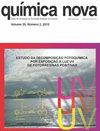UMA ANÁLISE DO PROCESSO DE ELABORAÇÃO DE PERGUNTAS PRODUZIDAS POR LICENCIANDOS EM QUÍMICA A PARTIR DA LITERATURA DE DIVULGAÇÃO CIENTÍFICA
IF 0.7
4区 化学
Q4 CHEMISTRY, MULTIDISCIPLINARY
引用次数: 0
Abstract
AN ANALYSIS OF THE PROCESS OF DEVELOPING QUESTIONS PRODUCED BY CHEMISTRY STUDENTS IN A TEACHING PROGRAM BASED ON SCIENTIFIC COMMUNICATION LITERATURE. The objective of the present investigation was to evaluate the use of scientific dissemination literature (SDL) in the process of formulating questions developed by chemistry students in a Teaching Program in Chemistry. To this end, the book entitled The Disappearing Spoon was analyzed in terms of categories referring to format and content, while the 18 questions produced by these students about the chapters read were analyzed in terms of presupposition and request. The investigation was carried out with 16 undergraduates who were taking a theoretical course on “Introduction to Chemistry”, as part of the Teaching Program in Chemistry. According to the analysis carried out, some particularities of format, such as the scarcity of visual resources, the autonomous structure of the chapters and the language, may have influenced the elaborated presentations. It is interesting to note that almost half of the questions produced were of an investigative nature, demonstrating the potential of SDL to stimulate high cognitive skills. In addition, the questions with investigative requests were mostly opinion questions, which may have been motivated by characteristics of the text read, such as the content with a controversial approach used by the author, when reporting on some aspects of scientific activity.对化学本科生提出的问题的阐述过程进行了分析,并从科学文献中进行了分析
基于科学传播文献的教学方案中化学学生提出问题的过程分析。本研究的目的是评估化学教学计划中化学学生在制定问题过程中使用科学传播文献(SDL)的情况。为此,我们对《消失的勺子》这本书从形式和内容的分类上进行了分析,对这些学生提出的关于所读章节的18个问题从预设和请求上进行了分析。调查对象是16名正在上“化学导论”理论课的本科生,这是化学教学计划的一部分。根据分析,格式的一些特殊性,如视觉资源的稀缺性,章节的自治结构和语言,可能影响了详细的陈述。有趣的是,几乎一半的问题都是调查性的,这表明SDL有可能激发高认知技能。此外,有调查要求的问题大多是意见问题,这些问题可能是由所读文本的特征引起的,例如作者在报道科学活动的某些方面时使用了有争议的方法的内容。
本文章由计算机程序翻译,如有差异,请以英文原文为准。
求助全文
约1分钟内获得全文
求助全文
来源期刊

Quimica Nova
化学-化学综合
CiteScore
1.60
自引率
12.50%
发文量
72
审稿时长
2-4 weeks
期刊介绍:
Química Nova publishes in portuguese, spanish and english, original research articles, revisions, technical notes and articles about education in chemistry. All the manuscripts submitted to QN are evaluated by, at least, two reviewers (from Brazil and abroad) of recognized expertise in the field of chemistry involved in the manuscript. The Editorial Council can be eventually asked to review manuscripts. Editors are responsible for the final edition of QN.
 求助内容:
求助内容: 应助结果提醒方式:
应助结果提醒方式:


